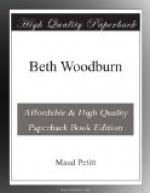Not a teacher in the village school but had marked
her strong literary powers, and she was not at all
slow to believe all the hopeful compliments paid her.
From a child her stories had filled columns in the
Briarsfield
Echo, and now she was eighteen
she told herself she was ready to reach out into the
great literary world—a nestling longing
to soar. Yes, she would be famous—Beth
Woodburn, of Briarsfield. She was sure of it.
She would write novels; oh, such grand novels!
She would drink from the very depths of nature and
human life. The stars, the daisies, sunsets,
rippling waters, love and sorrow, and all the infinite
chords that vibrate in the human soul—she
would weave them all with warp of gold. Oh, the
world would see what was in her soul! She would
be the bright particular star of Canadian literature;
and then wealth would flow in, too, and she would
fix up the old home. Dear old “daddy”
should retire and have everything he wanted:
and Aunt Prudence, on sweeping days, wouldn’t
mind moving “the trash,” as she called
her manuscripts. Daddy wouldn’t make her
go to bed at ten o’clock then; she would write
all night if she choose; she would have a little room
on purpose, and visitors at Briarsfield would pass
by the old rough-cast house and point it out as Beth
Woodburn’s home, and—well, this is
enough for a sample of Beth’s daydreams.
They were very exaggerated, perhaps, and a little
selfish, too; but she was not a fully-developed woman
yet, and the years were to bring sweeter fruit.
She had, undoubtedly, the soul of genius, but genius
takes years to unfold itself.
Then a soft expression crossed the face of the dreamer.
She leaned back, her eyes closed and a light smile
played about her lips. She was thinking of one
who had encouraged her so earnestly—a tall,
slender youth, with light curly hair, blue eyes and
a fair, almost girlish, face—too fair and
delicate for the ideal of most girls: but Beth
admired its paleness and delicate features, and Clarence
Mayfair had come to be often in her thoughts.
She remembered quite well when the Mayfairs had moved
into the neighborhood and taken possession of the
fine old manor beside the lake, and she had become
friends with the only daughter, Edith, at school,
and then with Clarence. Clarence wrote such pretty
little poems, too. This had been the foundation
of their friendship, and, since their tastes and ambitions
were so much alike, what if—
Her eyes grew brighter, and she almost fancied he
was looking down into her face. Oh, those eyes—hush,
maiden heart, be still. She smiled at the white
cloud drifting westward—a little boat-shaped
cloud, with two white figures in it, sailing in the
summer blue. The breeze ruffled her dark hair.
There fell a long shadow on the grass beside her.
“Clarence—Mr. Mayfair! I didn’t
see you coming. When did you get home?”
“Last night. I stayed in Toronto till the
report of our ‘exams’ came out.”




